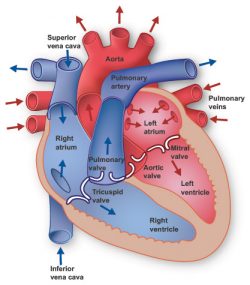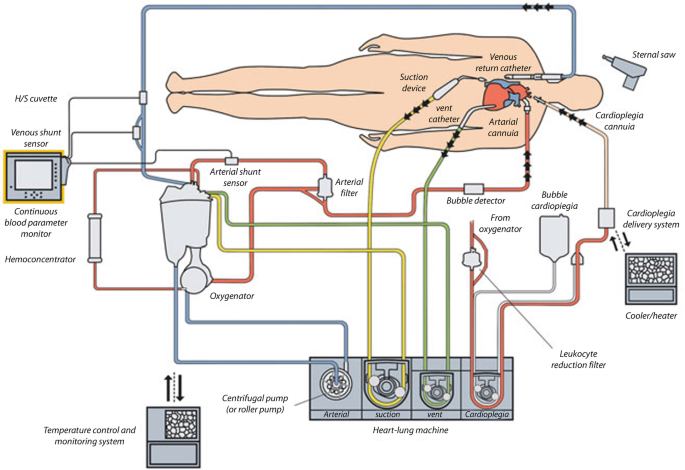Cleric wrote: ↑Thu Aug 28, 2025 8:35 amThe way I presently see it is that troubles come mainly from trying to divide things into such a binary way (maybe I sound like ML here). So it is either that the heart is a pump, and nothing else contributes to the blood flow, or the blood flow runs on its own, and the heart is only a sense/damming organ. The second binary pole is difficult to reconcile with something like this:Federica wrote: ↑Wed Aug 27, 2025 8:51 pm I have to say, I am unconvinced. Having in mind Steiners words, I can’t get onboard that, speaking of the heart not being a pump, he was referring to an unfolding spiritualization of man that would hopefully make his statements true in the decades to come, and that he overestimated that unfolding. At so many other occasions he’s crystal clear about the imminent, even catastrophic risks of mechanization of humanity. At other occasions, he speaks explicitly of organ transformation in the future. Why in this case would he have decided to speak strongly and repetitively about something he considered a work in progress under threat of mechanization? How he speaks is also relevant. He calls the pump theory “grotesque”, referring very decidedly to the heart movements as being an effect, not a cause, of the blood flow. Therefore my perception is that one cannot run with the hares and hunt with the hounds in this matter. Either one holds the conviction that the heart is primarily a pump and concludes that Steiner made a blunt mistake (not an overestimation), or Steiner is right, and the heart can’t be properly described by materialistic science, not even in its physical form. Because how he speaks makes it clear that he is talking about his present time. I would add, Steiner definitely thought that some organs are more spiritual than others, and these are the ones that materialism struggles the most explaining, like the spleen for instance, and the heart. In these organs, the function is more detached from the form than in other organs. By contrast, the eye for example, is almost a machine in and of itself. It’s almost like engulfed by the outer environment and much more under the purview of the laws of physics.
About your point on cardiopulmonary resuscitation (which I know well by having taken multiple trainings to it) I propose that the explanation could be as follows - as a thought experiment, not as a firm conviction. So this is a situation of respiratory arrest and cardiac arrest (or soon-to-be cardiac arrest). It’s clear that, as you say, it doesn’t make much sense that chest compressions somehow trick the blood into moving itself. But it seems to me, this is not sufficient to conclude that pumping is demonstrated. It could also be that, by compressing the chest, heart contractions and expansions are induced from without, and the dispatching heart activity (lawful opening and closing of valves) can be maintained. In other words, thanks to the CPR assistance, the failing heart doesn’t completely capture and block the blood flow, standing in the way of the circulatory paths. The valves are ‘squeezed open and closed’ and the flow can continue through. So, it seems possible to me that CPR works and Steiner is right at the same time. Then CPR would work by maintaining the damming function (I feel that retaining/ organizing/ dispatching, like at a crossroads, is a better image than damming - Stau in German) rather than by maintaining pumping.
Is all this plausible?
PS: Steiner at the beginning of the XXth already saw in cellular life a fully Ahrimanic force.
Notice that they do not even use blood in these experiments. They use a completely inorganic clear fluid (Krebs–Henseleit solution) with a salt profile similar to that of blood. Go explain to these guys that their fluid will keep moving even if they bypass the heart and simply short-circuit the pipes.
As I tried to convey in the previous post, the main point is that from a perspective that includes the full spectrum of reality, everything should be grasped as a living interplay. Yet, in the process of the rigidifying of the physical world, more and more compromises must have been made. I don't see anything problematic in the fact that the holistic (etheric precursor) circulatory system rigidified in such a way that one organ could act as the main contributor to the flow. The key is simply to think of the whole system as something indeed whole. As many things, it has polarized into more active and more passive poles, and we only assume the proper evolutionary stance when we strive to find this holistic spiritual precursor.
Cleric, I do not get how this video brings value to the conversation. How to compare what a dead heart is induced to do in such experiments with a living heart, beating in the chest of a living human being, with their own warm blood flowing through? What they are doing is not a demonstration of what a living heart and a living blood do or don't do. I am struggling to recognize you in the post you have just written. I have well understood how you presently see things. You have pointed to the importance of seeing things holistically, and that (simplified) the etheric circulation is an active whole, not that one part of it causes the movement of other. And in your view, what Steiner meant by his contention is grounded in this balanced etheric understanding, so that he was wrong only in timing (simplified) since mechanization has worked harder than he anticipated. From there, you point at the heart in physical space and say: the physical heart does pump blood as a primary function (among other things it does) and Steiner simply underestimated things, counting on a slightly more spiritual turn in the evolution than what actually happened. As a side note, I also thought it was surprising that a mere century of human evolution may have made such a significant difference in human physiology. In any case my two points remain hanging, both:
1. If the heart does pump (among other things it does), I think it's untenable to say that Steiner simply underestimated things, because he strongly stated that the physical blood causes the movement of the physical heart. And that the physical heart does not cause the movement of the blood. This is basically the opposite of the holistic view you have conveyed. So it's not that I reject or didn't pay attention to your holistic view. It's that Steiner's purposes on the question are so strong and so recurrent that one has to conclude he made a blunder (from your perspective).
2. You have used the CPR example as a logical corroboration that the heart pumps. I have said how I doubt it is logical.
And now you share this video, as if to suggest that organs inside and outside the body are the same, and that all living organs are equally described by laws of physics? As you know, I personally don't have the capacity to inquire about these things supersensibly by myself. But I do feel that, if Steiner really made a blunder on the heart, it would not be like a minor mistake, like when he was wrong on future trends in world population or something. This is at the core of his entire conception of the human physical sheath as a microcosm of the universe. What he meant is that the I moves the physical blood.
But even beyond what Steiner thought - and ultimately this is more important - do you think it is possible that a living organ, holistically intended, in a living human being, can operate in ways that may escape the explanatory intents of current science? Do you think it is possible that the physical blood is moved by forces that physics today cannot entirely account for? That we leave aside the CPR or Steiner’s mistake is not important, these are secondary points in a sense, but please at least tell us if you think the above is possible. You seem to intend that it is possible, when you say "The same can be said also for the aliased physical subset of inner space, but in a way, the activity is constrained in such a way that it appears too predictable, and we call it laws of nature". But that's vague - in my understanding, of course. You seem to mean “yes, but no”. Yes, the blood is active, but actually it isn't. And you seem to imply that the laws of physics describe the nature within and the nature without just as well.

